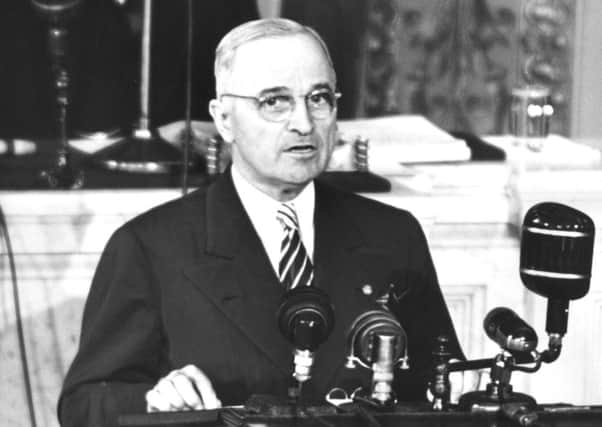Martyn McLaughlin: Order which sparked Red Scare is a warning from history


The 12-page document, issued by the White House, details a sweeping range of specific powers in the service of patriotism. Its opening four paragraphs, directed at the millions of employees across the executive branch of the US federal government, makes clear the president’s expectations, but also the repercussions of failing to meet them.
“Each employee,” it begins, “is endowed with a measure of trusteeship over the democratic process which are the heart and sinew of the US.” It is, the order states, of “vital importance” that every individual show “complete and unswerving loyalty” to their country.
Advertisement
Hide AdAdvertisement
Hide AdHaving dispensed with the niceties, the following two paragraphs of the order get to the heart of the matter. “Although the loyalty of by far the overwhelming majority of all government employees is beyond question, the presence within the government service of any disloyal or subversive person constitutes a threat to our democratic processes,” it adds. “Maximum protection must be afforded the US against infiltration of disloyal persons into the ranks of its employees.”
You would be forgiven for thinking this order is the work of Donald Trump. After all, it bears many of his administration’s hallmarks: the crusade against an ill-defined threat; the stern language conflating jingoism and duty; the unshirking insistence that America, the institution, must always come first.
Look closer, however, and the anomalies start to appear: the emphasis on the importance of protecting “democratic processes”; the smart turn of phrase; the rich, almost antiquated vocabulary.
In fact, Executive Order 9835 was introduced on 22 March 1947, and the signature at the foothill of the document is not that of President Trump, but President Harry S Truman. Some 70 years to the day, it reads like a warning from the past.
The broad brush of history may have painted Truman as the plain-speaking Missouri farmer who held America together through torrid times, but the devil of his legacy is most certainly in the detail. Executive Order 9835, or as it became known, the Loyalty Order, was a shameful blight on both his record and his country, one which paved the way for the egregious witch hunts of McCarthyism.
It established so-called loyalty boards which were empowered to scrutinise federal employees, who could be dismissed on basis of anonymous, uncorroborated allegations to J Edgar Hoover’s FBI; hundreds of workers were forced from office.
The crude and damaging correlation between an individual’s loyalty to their country and their fitness to work seems like a historic misstep, but given the White House ethno-nationalist ideologues fighting their own demons - take your pick from Islamic extremists, immigrants, and liberals - systematic political repression is a credible threat.
On Monday, it emerged the Trump administration had appointed a slew of aides across cabinet agencies, whose sole purpose is to monitor the obedience of staff to the president and his agenda.
Advertisement
Hide AdAdvertisement
Hide AdAccording to the Washington Post, no less than 16 political appointees have been installed across various government departments. The aide at the Pentagon, Brett Bryers, has already been nicknamed ‘the commissar’, a reference to Soviet-era Communist Party officials assigned to military units to ensure their commanders remained loyal.
The move may smack of paranoia, yet you only have to consider the justification offered by Newt Gingrich, a Trump ally, to appreciate the contempt for civil servants. “If you drain the swamp, you better have someone who watches over the alligators,” the former speaker of the House of Representatives said. “These people are actively trying to undermine the new government, and they think it’s their moral obligation to do so.”
The targets of this network may be senior officials, but there are ominous signs that the 45th president has the appetite to extend its reach. Trump, who was schooled by Roy Cohn, himself a protégé of Joseph McCarthy, has perpetuated the conspiracy of the ‘deep state’, a supposedly clandestine network of saboteurs located throughout the government machine.
In a campaign speech on foreign policy last August, meanwhile, he spoke almost ruefully of the “Cold War” era, when “we had an ideological screening test.” He added: “The time is overdue for a new test.” Just two months before, Gingrich called for congress to revive the House of Un-American Activities Committee.
As Trump continues to whip up hysteria and hatred while seeking enforce his revised travel ban on six Muslim-majority countries, it is worth recalling the remarks of Clark Clifford, a former White House counsel and one of Truman’s closest advisers. Allowing the loyalty order to proceed unchecked, he reflected, was his biggest regret.
“My own feeling was there was not a serious loyalty problem,” he told the journalist Carl Bernstein. “I felt the whole thing was manufactured. We never had a serious discussion about a real loyalty problem.”
He added: “I have the sensation that the president didn’t attach fundamental importance to the so-called communist scare. But political pressures were such that he had to recognise it.”
Seven decades on, the nature of the scare has changed. The response, however, could be just as blunt.